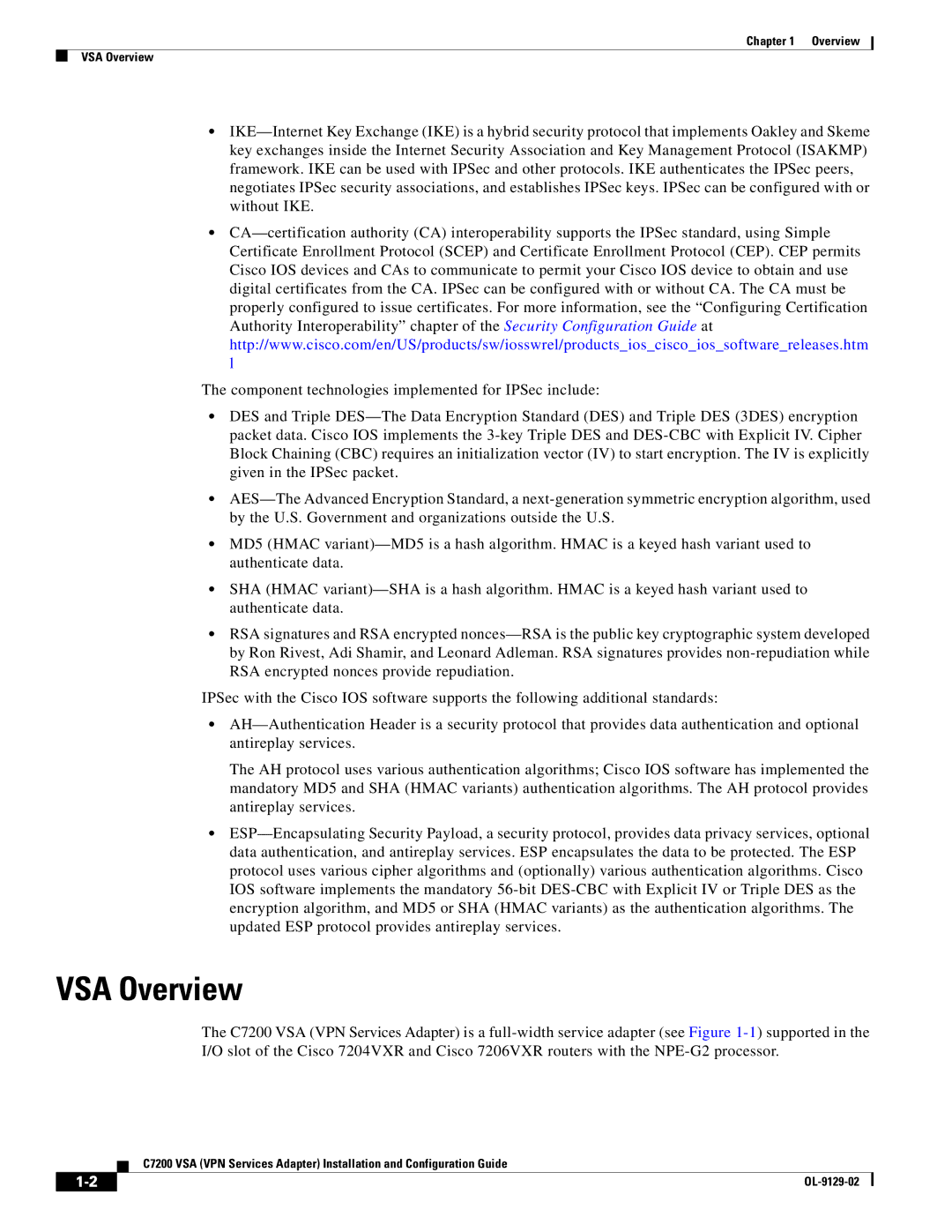Chapter 1 Overview
VSA Overview
•IKE—Internet Key Exchange (IKE) is a hybrid security protocol that implements Oakley and Skeme key exchanges inside the Internet Security Association and Key Management Protocol (ISAKMP) framework. IKE can be used with IPSec and other protocols. IKE authenticates the IPSec peers, negotiates IPSec security associations, and establishes IPSec keys. IPSec can be configured with or without IKE.
•CA—certification authority (CA) interoperability supports the IPSec standard, using Simple Certificate Enrollment Protocol (SCEP) and Certificate Enrollment Protocol (CEP). CEP permits Cisco IOS devices and CAs to communicate to permit your Cisco IOS device to obtain and use digital certificates from the CA. IPSec can be configured with or without CA. The CA must be properly configured to issue certificates. For more information, see the “Configuring Certification Authority Interoperability” chapter of the Security Configuration Guide at http://www.cisco.com/en/US/products/sw/iosswrel/products_ios_cisco_ios_software_releases.htm l
The component technologies implemented for IPSec include:
•DES and Triple DES—The Data Encryption Standard (DES) and Triple DES (3DES) encryption packet data. Cisco IOS implements the 3-key Triple DES and DES-CBC with Explicit IV. Cipher Block Chaining (CBC) requires an initialization vector (IV) to start encryption. The IV is explicitly given in the IPSec packet.
•AES—The Advanced Encryption Standard, a next-generation symmetric encryption algorithm, used by the U.S. Government and organizations outside the U.S.
•MD5 (HMAC variant)—MD5 is a hash algorithm. HMAC is a keyed hash variant used to authenticate data.
•SHA (HMAC variant)—SHA is a hash algorithm. HMAC is a keyed hash variant used to authenticate data.
•RSA signatures and RSA encrypted nonces—RSA is the public key cryptographic system developed by Ron Rivest, Adi Shamir, and Leonard Adleman. RSA signatures provides non-repudiation while RSA encrypted nonces provide repudiation.
IPSec with the Cisco IOS software supports the following additional standards:
•AH—Authentication Header is a security protocol that provides data authentication and optional antireplay services.
The AH protocol uses various authentication algorithms; Cisco IOS software has implemented the mandatory MD5 and SHA (HMAC variants) authentication algorithms. The AH protocol provides antireplay services.
•ESP—Encapsulating Security Payload, a security protocol, provides data privacy services, optional data authentication, and antireplay services. ESP encapsulates the data to be protected. The ESP protocol uses various cipher algorithms and (optionally) various authentication algorithms. Cisco IOS software implements the mandatory 56-bit DES-CBC with Explicit IV or Triple DES as the encryption algorithm, and MD5 or SHA (HMAC variants) as the authentication algorithms. The updated ESP protocol provides antireplay services.
VSA Overview
The C7200 VSA (VPN Services Adapter) is a full-width service adapter (see Figure 1-1) supported in the I/O slot of the Cisco 7204VXR and Cisco 7206VXR routers with the NPE-G2 processor.
C7200 VSA (VPN Services Adapter) Installation and Configuration Guide

